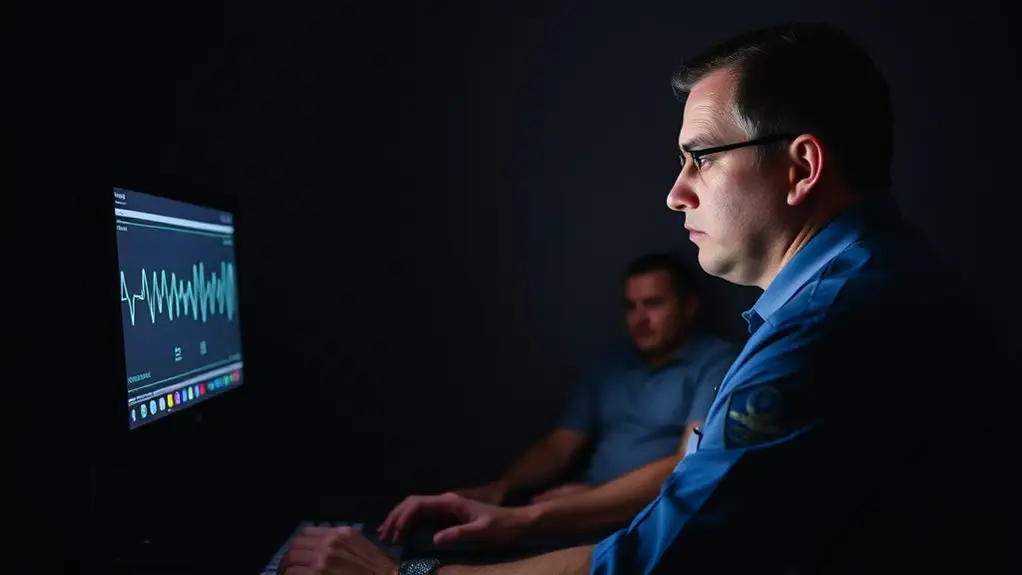As law enforcement agencies increasingly adopt the Computerized Voice Stress Analyzer (CVSA), the landscape of truth verification is undergoing a significant transformation. This technology, renowned for its high accuracy rate exceeding 96%, provides investigators with a reliable tool for detecting deception in sensitive cases. The adoption of CVSA in Law Enforcement not only streamlines investigative processes but also equips officers with advanced interrogation skills. With its growing influence, one might wonder how CVSA will shape the future of criminal investigations and beyond.

Widespread Adoption and User Base of CVSA
The adoption of the Computer Voice Stress Analyzer (CVSA) by nearly 3,000 law enforcement agencies signifies a major shift in truth verification methods within the sector.
The widespread integration of CVSA highlights its critical role in enhancing investigative capabilities. CVSA training programs are essential, equipping officers with the skills to effectively operate this technology.
Agency implementation varies, with larger departments such as the California Department of Corrections deploying numerous devices to leverage their benefits across multiple facilities.
This strategic deployment underscores the reliance on CVSA as a preferred tool for truth verification, reflecting its growing importance in law enforcement practices.
Key Advantages and Operational Benefits
Given its unparalleled efficacy, CVSA provides numerous operational benefits that greatly enhance law enforcement capabilities.
Its cost efficiency is particularly notable, allowing agencies to deploy multiple units without significant financial strain. Additionally, CVSA’s ease of use translates into minimal user training requirements, which reduces both the time and expense associated with preparing personnel to operate the system effectively.
These factors contribute to its widespread adoption across various law enforcement units, elevating the standard of investigations and daily operations.
Proven Accuracy in Various Investigations
Building on its notable operational benefits, CVSA’s reputation is further solidified by its proven accuracy in various investigations.
Numerous law enforcement agencies report significant improvements in investigative outcomes, attributing this success to CVSA’s high accuracy metrics. Studies, such as one published in The Journal of Child Sexual Abuse, highlight a remarkable accuracy rate exceeding 96 percent, particularly in sensitive cases like sexual offenses.
This reliability not only boosts the tool’s credibility but also enhances the effectiveness of investigations by providing clear, actionable insights. Consequently, CVSA’s deployment continues to expand, driven by its substantial contributions to truth verification processes.
Expanding Beyond Law Enforcement: Military Applications
While CVSA has become integral to numerous law enforcement agencies, its utility extends considerably into military operations.
In contexts where military intelligence is critical, the CVSA is employed to enhance interrogation techniques. Utilized by U.S. military special forces in conflict zones such as Iraq and Afghanistan, it aids in the screening of captured terrorists, ensuring swift and accurate assessment of threats.
At the Guantanamo Bay naval base, CVSA’s deployment underscores its importance in national security measures. This adaptation highlights the system’s versatility and effectiveness, proving essential not only in civilian law enforcement but also in complex military environments.
Endorsements and Testimonials Supporting CVSA’s Efficacy
Endorsements from high-profile law enforcement and military figures have greatly bolstered the credibility of the Computer Voice Stress Analyzer (CVSA).
Expert opinions frequently highlight its unparalleled accuracy and cost-effectiveness, making it a preferred tool in sensitive investigations.
User experiences further substantiate its efficacy, with numerous agencies reporting significant success in solving crimes, including cold cases.
For instance, the Illinois State Police and California Department of Corrections have shared testimonial evidence of CVSA’s crucial role in enhancing their investigative outcomes.
These endorsements serve not only to validate the device but also to encourage its broader adoption across various security domains.
Frequently Asked Questions
How Does CVSA Technology Differ From Traditional Polygraph Tests?
CVSA technology utilizes voice analysis to detect stress, differing from traditional polygraph tests that measure physiological responses. This method claims higher detection accuracy and is increasingly preferred by law enforcement agencies for its reliability.
Are There Any Legal Restrictions on CVSA Use in Certain States or Countries?
The legality and regulations of CVSA use vary by jurisdiction. Some states and countries may impose restrictions or specific guidelines on its application in law enforcement and judicial proceedings to guarantee ethical usage.
Can CVSA Results Be Used as Evidence in Court Proceedings?
The court admissibility of CVSA results varies, often not meeting the stringent evidentiary standards required for use in court proceedings, thereby limiting its direct application as decisive evidence in many legal jurisdictions.
How Does CVSA Handle Ambiguous or Unclear Voice Recordings?
CVSA employs voice clarity techniques and recording interpretation strategies to address ambiguous or unclear voice recordings, ensuring accurate analysis and reliable results in truth verification processes within law enforcement and security operations.
What Specific Training Is Required to Operate a CVSA Device?
To operate a CVSA device, specific training in voice analysis is required, leading to operator certification. This training guarantees that users are proficient in handling the technology for accurate truth verification in investigations.
Conclusion
As the landscape of truth verification evolves, Computer Voice Stress Analysis (CVSA) is emerging as a powerful tool in various fields. While less invasive than traditional polygraphs, CVSA technology presents both opportunities and challenges for law enforcement. The role of lie detection in modern law enforcement continues to evolve, balancing the pursuit of justice with ethical considerations and privacy concerns. As these advanced methods become more widespread, we may see significant changes in how truth is verified not just in law enforcement, but in various aspects of society.
In cases where CVSA results may have legal implications or you’re facing complex personal disputes, it’s essential to seek professional legal advice. The Rooney Law Firm specializes in criminal defense and has over 30 years of experience fighting for clients’ rights. Their experienced attorneys can help you understand your rights and the best course of action, ensuring that you make informed decisions in challenging legal matters, including those involving lie detection technologies like CVSA or polygraph tests.
